Acupuncture piercing is a new way to decorate your body. It mixes old healing methods with new piercing styles. This mix is becoming popular in the UK, where people look for new ways to express themselves and feel better.
More and more people want to know about acupuncture piercing. If you’re in the UK and interested, finding a good practitioner is key. You can begin by calling a professional at 07415278022.
Key Takeaways
- Acupuncture piercing combines traditional healing with modern body art.
- It offers a unique form of self-expression and wellness.
- The practice is gaining popularity across the UK.
- Ear piercing is a common application of acupuncture piercing techniques.
- Finding a qualified practitioner is essential for a safe experience.
The Fundamentals of Acupuncture Piercing
Acupuncture piercing is where old healing meets new body art. It uses ancient Chinese medicine to heal and balance the body. This is done by targeting special points on the body.
The Intersection of Ancient Healing and Modern Body Modification
It mixes the healing of acupuncture with the look of body piercing. Practitioners use clean needles to pierce certain body points. They aim to balance the body’s energy, or meridians.
This method is great for those wanting a natural health boost.
- Stimulates healing and balance
- Targets specific pressure points
- Combines traditional Chinese medicine with modern body modification
How Acupuncture Piercing Differs from Traditional Acupuncture
Traditional acupuncture uses fine needles to balance energy. But acupuncture piercing uses bigger needles that stay in longer. They act as body art.
Finding a good practitioner is key. Looking for “piercing near me” is a good start.
Key differences include:
- Needle size and material
- Duration the needle remains in place
- Aesthetic purpose alongside therapeutic benefit
The Historical Origins of Acupuncture Piercing
Acupuncture piercing comes from ancient Chinese medicine. It has grown over centuries, mixing healing with body art.
Ancient Chinese Medicine Foundations
Acupuncture is over 3,000 years old. It’s based on energy pathways in the body. Practitioners use needles to balance this energy, helping health.
Acupuncture piercing uses piercing to stimulate these points.
Evolution into Contemporary Practice
As cultures meet, acupuncture piercing has changed. It now uses new techniques but keeps its roots. It’s now seen as body art too.
“Acupuncture piercing is a mix of old healing and new art,” say experts. 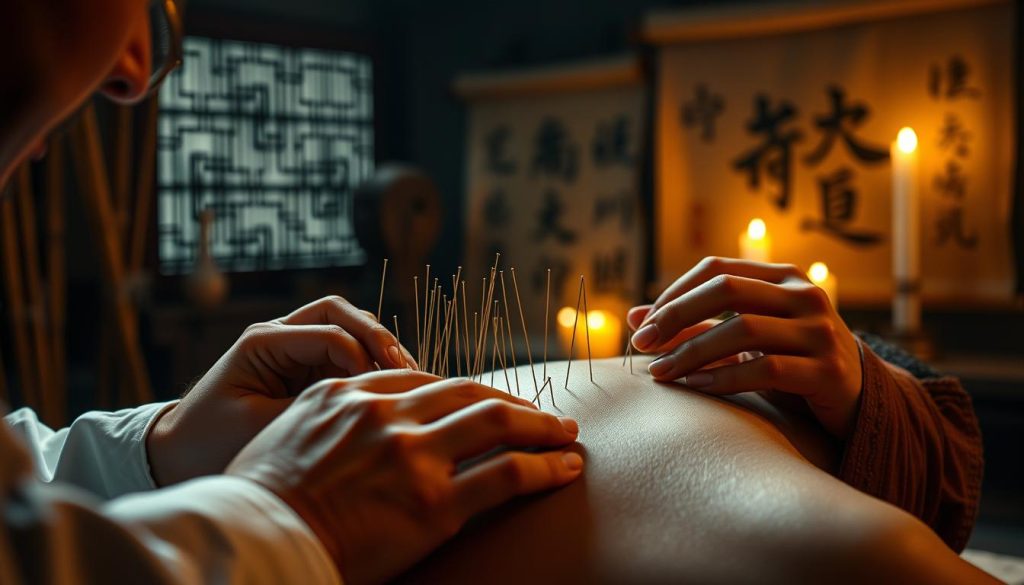
This change shows how ancient ideas stay relevant. As more people seek holistic health, acupuncture piercing will keep growing.
Understanding the Science Behind Acupuncture Piercing
The science of acupuncture piercing comes from traditional Chinese medicine. It’s used today to help the body heal and feel better. It works by stimulating meridian points and energy pathways in the body.
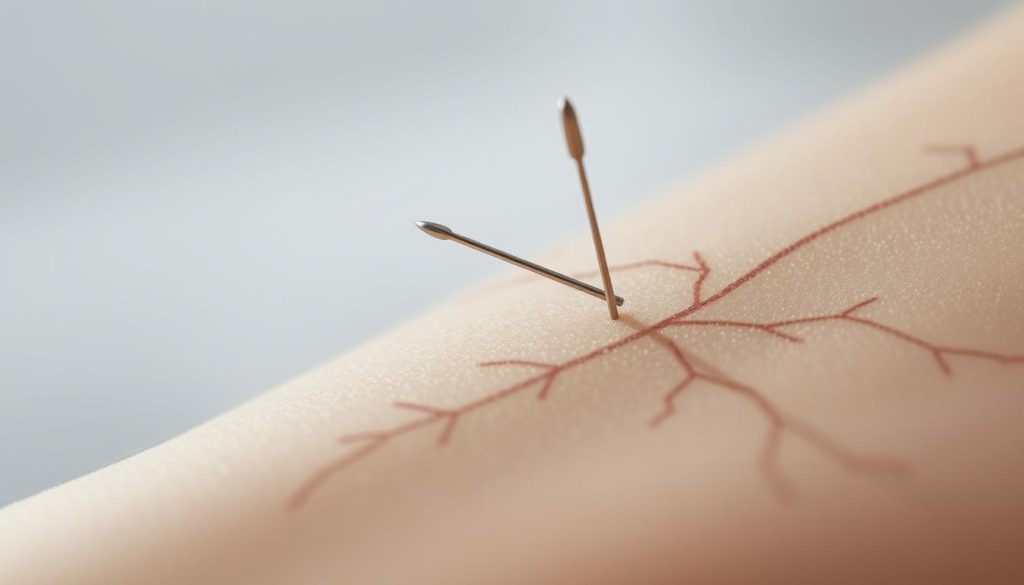
Meridian Points and Energy Pathways
Traditional Chinese medicine says our bodies have a network of meridian points. These points help qi (life energy) flow. Acupuncture piercing aims to activate these points, helping our qi flow and balance.
| Meridian Point | Location | Benefit |
|---|---|---|
| Liver 3 | On the foot, between the first and second toes | Relieves stress and anxiety |
| Large Intestine 4 | On the hand, between the thumb and index finger | Relieves pain and promotes digestion |
Scientific Research and Evidence
Acupuncture piercing’s roots are in traditional Chinese medicine. But, scientific research is growing. It shows acupuncture piercing can help both physical and mental health.
Before trying acupuncture piercing, know the piercing UK prices. Also, find a qualified practitioner in your area.
Health Benefits of Acupuncture Piercing
Acupuncture piercing mixes old healing ways with new body art. It boosts health and wellbeing. It offers many benefits, from physical health to mental and emotional wellbeing.
Physical Health Advantages
Acupuncture piercing helps the body heal itself. It can lead to better physical health. For example, daith piercing might help with migraines.
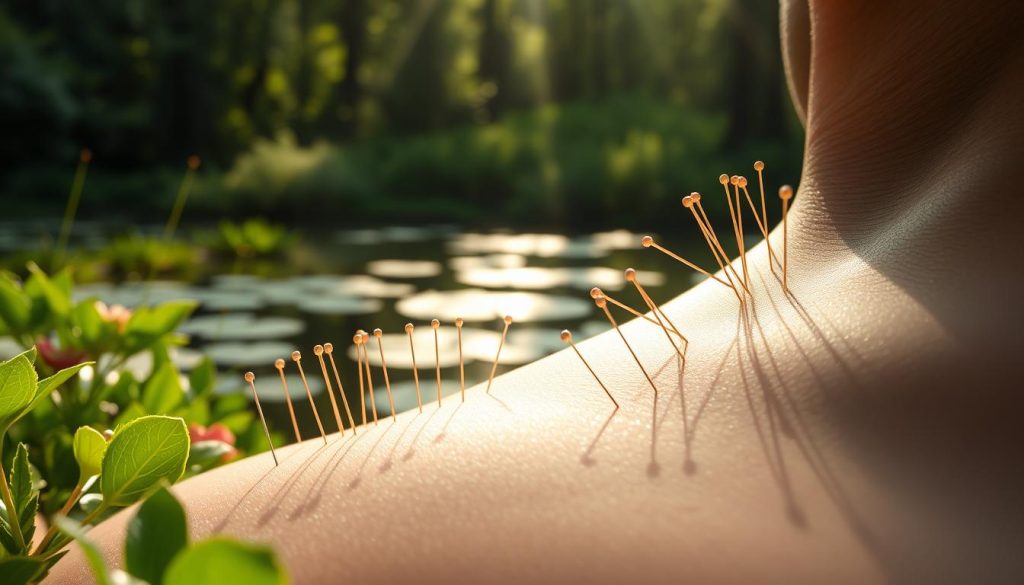
Mental and Emotional Wellbeing Benefits
Acupuncture piercing also helps the mind and emotions. It can reduce stress and anxiety. This leads to a calm and relaxed state.
Reducing anxiety and stress is a big plus for those who try it. It affects the body’s energy flow, or meridians. This can stabilize mood and reduce overwhelm.
Specific Conditions That May Benefit
Acupuncture piercing can help with many health issues. The table below shows some conditions and the benefits of acupuncture piercing for each.
| Condition | Potential Benefits |
|---|---|
| Migraines | Reduced frequency and severity of migraine attacks |
| Anxiety and Stress | Improved emotional regulation, reduced feelings of anxiety |
| Chronic Pain | Relief from persistent pain, improved quality of life |
More research is needed to fully grasp acupuncture piercing’s benefits. But, current evidence shows it’s a valuable therapy for many health issues. If you’re thinking about it, talk to a qualified practitioner about your needs and benefits.
Types of Acupuncture Piercing in the UK
The UK has seen a rise in acupuncture piercing. Several methods are available, each with its own benefits. This mix of traditional acupuncture and modern body modification is attracting those seeking holistic health solutions.
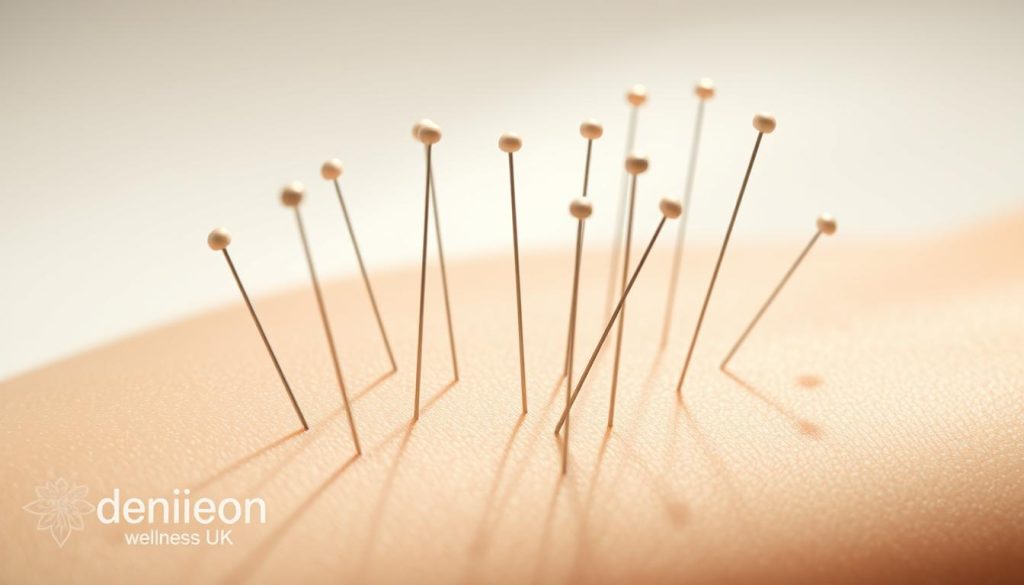
Ear (Auricular) Acupuncture Piercing Techniques
Ear piercing is a popular form of acupuncture piercing. Techniques like auricular acupuncture are widely practiced. This method involves piercing specific points on the ear to stimulate healing and balance within the body.
Auricular acupuncture is known for its effectiveness in addressing issues like stress, anxiety, and chronic pain. Practitioners in the UK use this technique to help patients manage a range of health concerns.
Body Acupuncture Piercing Locations
Body acupuncture piercing involves targeting specific meridian points on the body. This is to restore energy flow and promote wellbeing. Common locations include the lower back, abdomen, and limbs.
By stimulating these areas, practitioners aim to alleviate symptoms associated with various conditions. This enhances overall health.
Daith Piercing for Migraines and Anxiety
Daith piercing, a specific type of ear piercing, has gained attention. It is believed to reduce migraines and anxiety. By targeting a particular point in the ear, this technique is thought to help alleviate symptoms.
Many individuals in the UK are turning to daith piercing as a complementary therapy. They use it to manage their health.
The Complete Acupuncture Piercing Procedure
The acupuncture piercing process is detailed. It starts with consultations, then precise piercing, and ends with aftercare. This ensures a safe and effective experience for those trying this unique mix of traditional Chinese medicine and modern body art.
Preparation and Consultation
A thorough consultation is key before acupuncture piercing. You’ll talk about your health history, why you want the piercing, and any worries. The practitioner will explain the process, risks, and benefits, making sure you know everything.
It’s important to share any health issues or medications to make the procedure safe for you.
The Piercing Process Step by Step
The first step is finding the right meridian points for you. Then, the practitioner uses sterile tools to do the piercing. Most sessions take 30 to 60 minutes.
Precision and cleanliness are very important to avoid risks and help your body heal quickly.
| Procedure Step | Description | Duration |
|---|---|---|
| Consultation | Discussion of medical history and procedure details | 15 minutes |
| Meridian Point Identification | Identifying relevant points for piercing | 10 minutes |
| Piercing | The actual piercing process | 10-30 minutes |
What to Expect During and After
During the piercing, you might feel a slight pinch. After, some redness or swelling is normal and usually goes away in a few hours. You’ll get aftercare tips to help your healing and avoid problems.
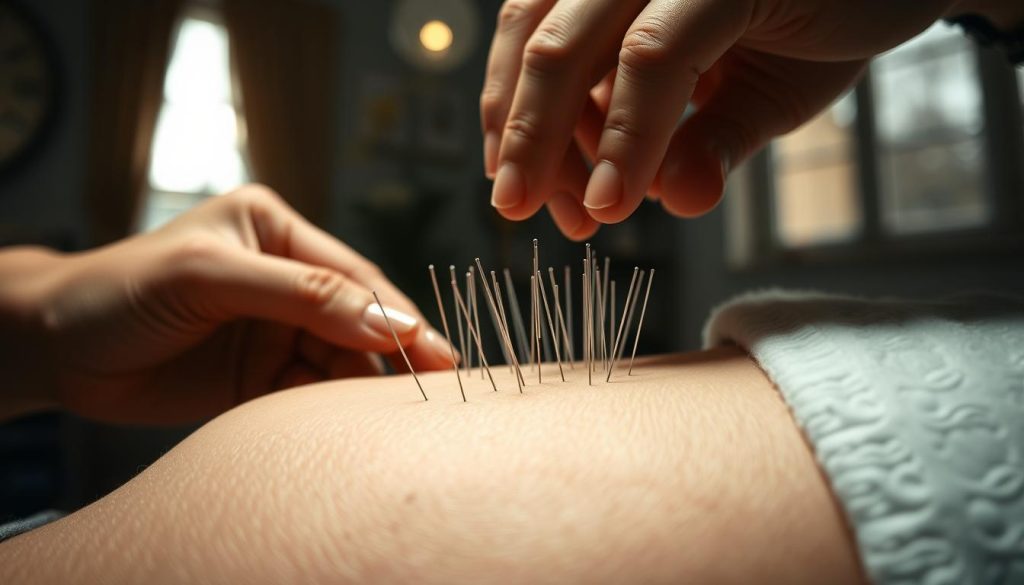
Essential Aftercare for Your Acupuncture Piercing
Looking after your acupuncture piercing is key to its healing. A good aftercare routine helps it heal right and keeps it safe from problems.
Daily Cleaning Routine
Keeping your piercing area clean is very important. Use a saline solution to clean it twice a day. Stay away from harsh chemicals and alcohol, as they can harm your skin and slow healing.
Signs of Healing vs. Infection
It’s important to know the difference between healing and infection. Healing piercings might be a bit red, swollen, or have some discharge. But, if you see more pain, a lot of discharge, or a bad smell, it could be infected. Watch your piercing closely and get help if you’re not sure.
| Signs | Healing | Infection |
|---|---|---|
| Redness/Swelling | Mild | Severe |
| Discharge | Clear or slightly yellow | Pus or foul-smelling |
| Pain | Decreasing | Increasing |
Long-term Maintenance
Even after your piercing heals, it needs ongoing care. Make sure the jewellery fits right and keep the piercing clean. Don’t change the jewellery too quickly, as it can irritate the piercing and slow healing.
“Proper aftercare is not just about the initial healing; it’s about maintaining the health of your piercing in the long term.” – Expert in Acupuncture Piercing
By sticking to these aftercare tips, your acupuncture piercing will heal well and stay healthy. This way, you can enjoy its benefits fully.
Potential Risks and Contraindications
Acupuncture piercing is generally safe but has its risks. Knowing these is key for making a smart choice, like getting an ear piercing uk or other piercings.
Common Side Effects
Side effects like redness, swelling, or minor bleeding can happen. These usually go away quickly. But, following aftercare tips is vital to avoid problems.
“Proper aftercare is key to preventing infection and ensuring the piercing heals correctly,” say experts.
When to Avoid Acupuncture Piercing
Some people should think twice about getting pierced. Those with hemophilia or on anticoagulants should talk to their doctor first. Pregnant women should also be careful and check with their healthcare provider.
When to Seek Medical Attention
If you see signs of infection like more redness, swelling, or discharge, get help. Also, if you have ongoing pain or fever, see a doctor. Knowing these signs can help make your piercing safe and successful.
Finding Acupuncture Piercing Services Near Me
If you’re thinking about acupuncture piercing, finding a good practitioner is key. This ancient practice is becoming more popular. So, it’s now easier to find a trusted service near you.
How to Research Local Practitioners
To find a reliable acupuncture piercing service, start by looking online. Check their websites, social media, and sites like Google or Yelp. This will give you an idea of their reputation and skills.
Also, ask friends, family, or healthcare professionals for recommendations. They might know someone good.
Qualifications to Look For
When choosing an acupuncture piercing practitioner, look for certain qualifications. They should have a degree in traditional Chinese medicine or something similar. Make sure they are registered with a professional body, like the British Acupuncture Council.
It’s important they have experience with acupuncture piercing. They should also know the risks and benefits well.
Questions to Ask Before Booking
Before you book, ask the right questions. Call 07415 278022 to ask about their services, qualifications, and experience.
Some questions to ask include: What experience do you have with acupuncture piercing? What qualifications do you have? What advice do you give for aftercare?
| Qualification | Description | Importance |
|---|---|---|
| Degree in Traditional Chinese Medicine | A degree that shows expertise in traditional Chinese medicine | High |
| Registration with Professional Body | Being registered with a body like the British Acupuncture Council | High |
| Experience in Acupuncture Piercing | Experience in doing acupuncture piercing | High |
Ear Piercing UK: Acupuncture vs. Traditional Methods
In the UK, you can choose between acupuncture piercing and traditional methods for ear piercing. Each has its own benefits and things to consider.
Comparing Techniques and Equipment
Acupuncture piercing and traditional ear piercing are quite different. Acupuncture uses fine, sterile needles based on traditional Chinese medicine. Traditional ear piercing uses a gun or needle to make a hole in the earlobe or cartilage. Acupuncture piercing is often seen as more precise and clean.
Key differences in techniques and equipment include:
- The use of sterile needles in acupuncture piercing
- The precision of needle placement in acupuncture
- The less trauma risk with acupuncture techniques
Safety Standards in the UK
Safety is very important in ear piercing, no matter the method. In the UK, both acupuncture and traditional piercing follow strict rules for hygiene and safety. It’s vital to pick a licensed and reputable practitioner to avoid risks.
To ensure safety, look for practitioners who:
- Use sterile equipment and follow proper hygiene practices
- Are licensed and registered with relevant professional bodies
- Provide clear aftercare instructions
Piercing UK Prices: What to Expect for Acupuncture Piercing
💡 Micro CTA: See full pricing— visit our prices page .
What’s Included in the Price
When you think about acupuncture piercing, it’s important to know what you get for your money. Usually, the price includes the first meeting, the piercing, and advice on aftercare. Some might also offer extra services like follow-up visits or personalized aftercare products.
Make sure to ask what’s included when you book. Knowing the full cost and what you get will help you decide better.
Client Experiences: Acupuncture Piercing Success Stories
Many people have tried acupuncture piercing for better health and wellbeing. It combines ancient acupuncture with modern piercing. This mix has helped many find relief from pain and improve their overall health.
Testimonials for Pain Management
Those who got acupuncture piercing for pain have seen big changes. They’ve noticed a significant reduction in pain levels. People with chronic pain have found they can move better and live better lives.
| Condition | Reported Improvement |
|---|---|
| Chronic Pain | 75% reduction in pain levels |
| Migraine | 50% decrease in frequency |
Wellness Improvement Stories
Acupuncture piercing does more than just ease pain. It also boosts overall wellness. People say they feel more mentally clear and emotionally balanced. This leads to a more balanced life.
Conclusion: Is Acupuncture Piercing Right for You?
Acupuncture piercing mixes old healing ways with new body art. It uses traditional acupuncture and the look of body piercing. In the UK, ear piercing is very popular.
Thinking about acupuncture piercing? You should look at the good and bad sides. It can help your health and mind, which is great. But, you need to know how it works, how to care for it, and when to avoid it.
Before you decide, find out about local experts and their skills. Know the costs and what you get for your money. This will help you choose if acupuncture piercing, like ear piercing in the UK, is for you.









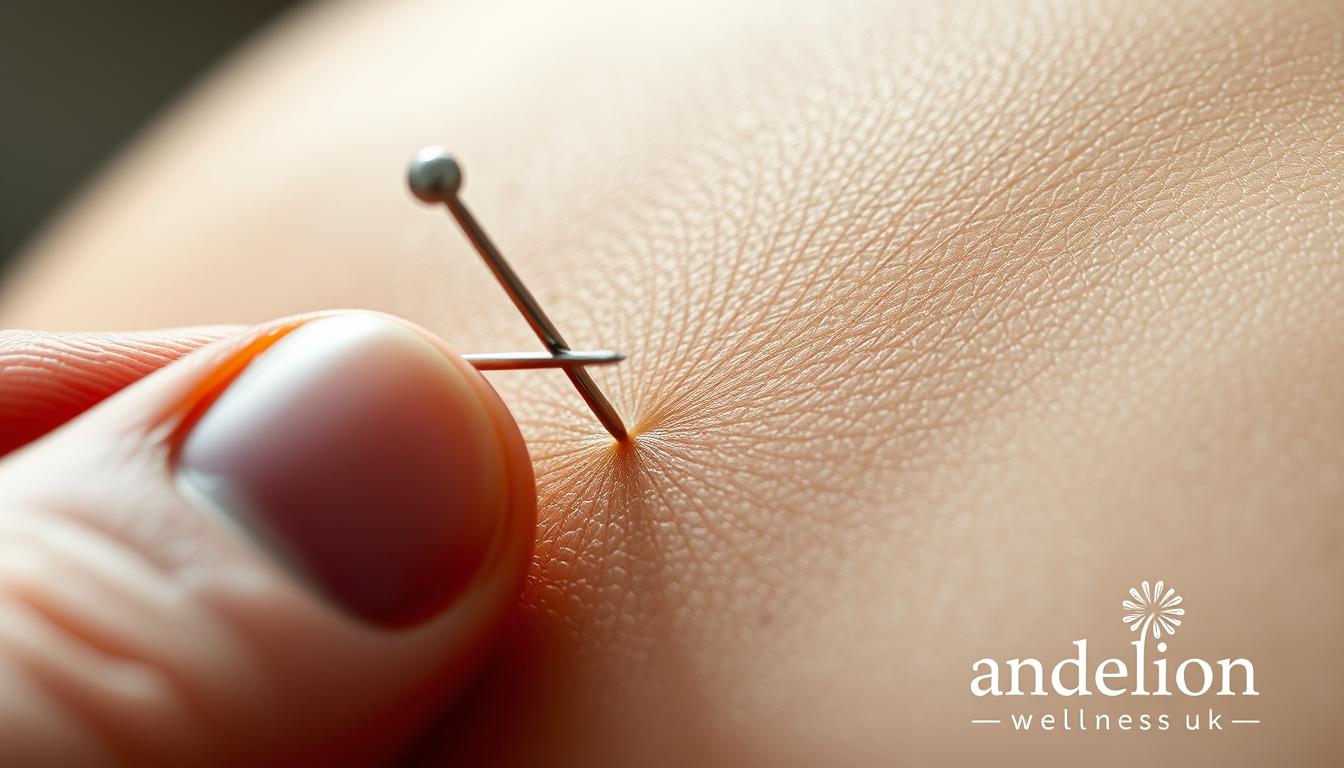
No Comments